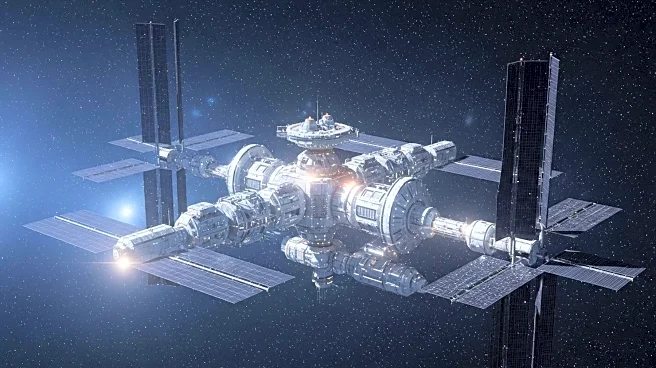What's Happening?
NASA has announced plans to deorbit the International Space Station (ISS) in 2030, marking the end of a continuous human presence in low-Earth orbit that began in November 2000. The ISS has been a collaborative effort among the United States, Europe, Canada, Japan, and Russia, serving as a platform for significant scientific research across various domains. Over 4,000 experiments have been conducted aboard the ISS, resulting in more than 4,400 research publications. NASA is now focusing on developing privately owned, commercially operated space stations to continue research in low-Earth orbit. In December 2021, NASA awarded contracts to stimulate the development of these commercial stations, with plans to launch them before the ISS is decommissioned.
Why It's Important?
The retirement of the ISS represents a significant shift in space exploration and research. The move towards commercial space stations is expected to foster innovation and reduce costs, as private companies take on roles traditionally held by government agencies. This transition could lead to increased opportunities for scientific research and technological advancements, benefiting industries such as biotechnology, materials science, and Earth science. The development of commercial space stations also aligns with NASA's strategy to leverage private sector capabilities, potentially accelerating the pace of space exploration and expanding access to space for various stakeholders.
What's Next?
NASA has issued a draft announcement for Phase 2 partnership proposals for commercial space stations, with plans to fund critical design reviews and demonstrate stations capable of supporting four people in orbit for at least 30 days. The agency will proceed with formal design acceptance and certification to ensure safety standards are met. Meanwhile, China will continue operations aboard its Tiangong space station, potentially becoming the longest continually inhabited space station once the ISS is retired. The success of commercial space stations will depend on the ability of selected companies to meet NASA's requirements and timelines.
Beyond the Headlines
The shift to commercial space stations raises questions about the future of international cooperation in space. While the ISS has been a symbol of global collaboration, the emergence of privately operated stations may alter the dynamics of space partnerships. Additionally, the environmental impact of deorbiting the ISS and the sustainability of new space stations are important considerations. The transition also highlights the growing role of the private sector in space exploration, which could lead to new business models and opportunities for investment.









